Is pump a closed syllable – Embark on a linguistic adventure as we delve into the captivating world of syllables, exploring the intriguing question: is “pump” a closed syllable? Prepare to be captivated by a narrative that unravels the mysteries of syllable structure, uncovering the secrets that lie within this fascinating word.
We’ll navigate through the intricacies of open and closed syllables, examining their defining characteristics and uncovering the unique features that distinguish “pump” from its syllabic counterparts. Join us on this journey of linguistic discovery, where knowledge flows effortlessly and clarity prevails.
Understanding Syllable Structure
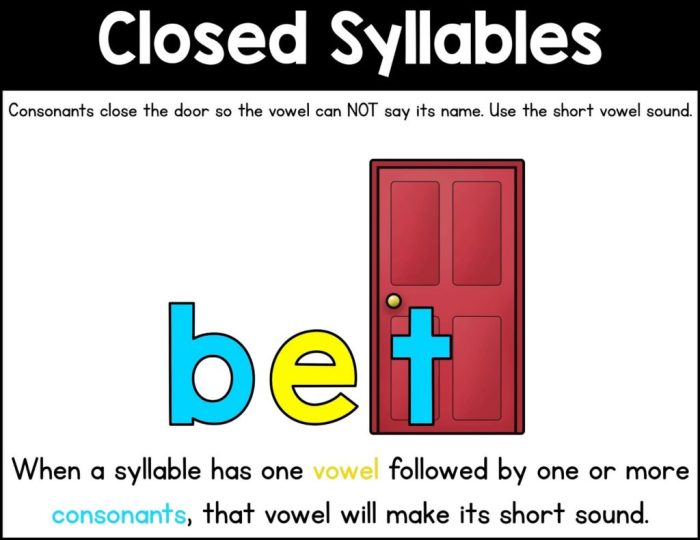
Syllables are the basic units of sound in a language. They consist of a vowel sound, either alone or combined with one or more consonant sounds.
Syllables can be either open or closed.
Open Syllables
An open syllable ends in a vowel sound. This means that the vowel sound is not followed by a consonant sound.
Examples of open syllables include:
- ba
- be
- bi
- bo
- bu
Closed Syllables
A closed syllable ends in a consonant sound. This means that the vowel sound is followed by one or more consonant sounds.
Examples of closed syllables include:
- bad
- bed
- bid
- bod
- bud
Analyzing the Word “Pump”: Is Pump A Closed Syllable
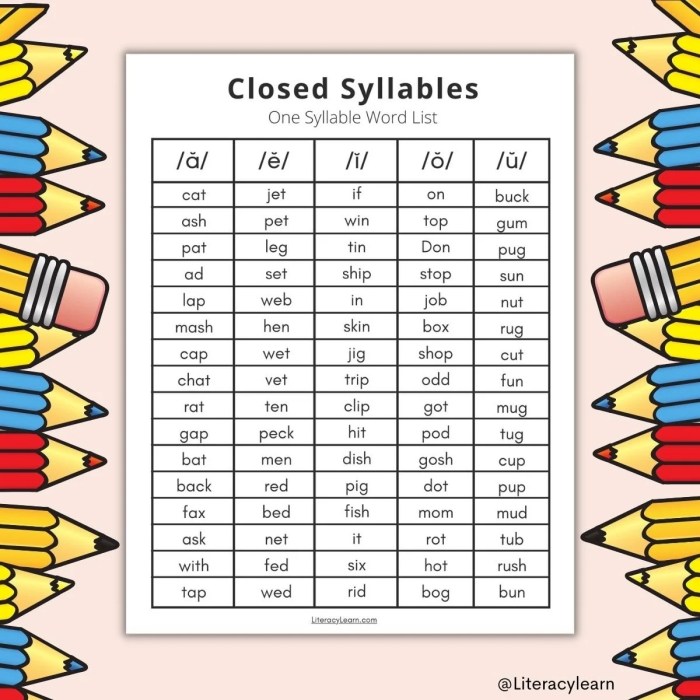
The word “pump” consists of one syllable, making it a monosyllabic word. The syllable structure of “pump” can be broken down as follows:
Number of Syllables in “Pump”
- The word “pump” has one syllable.
Open or Closed Syllable in “Pump”
A closed syllable ends with a consonant sound, while an open syllable ends with a vowel sound. In the word “pump,” the syllable ends with the consonant sound “/m/,” making it a closed syllable.
- The final syllable in “pump” is a closed syllable.
Phonological Features of “Pump”
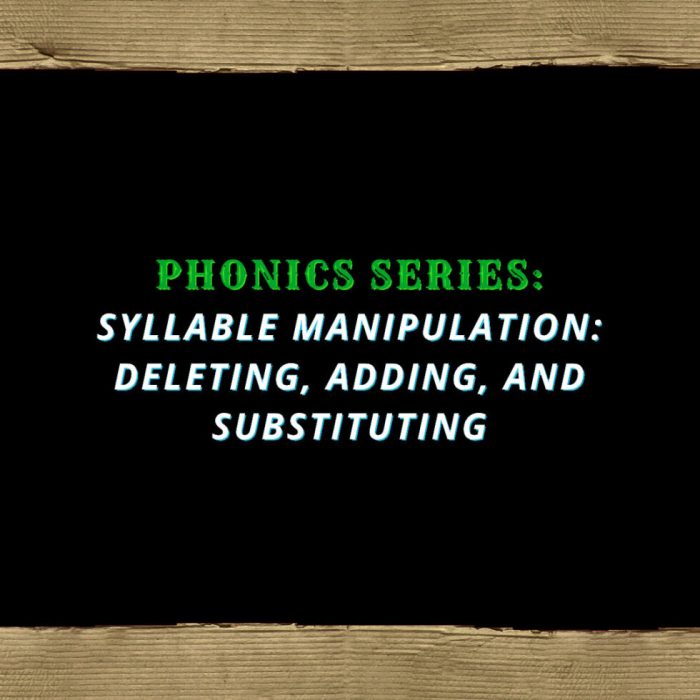
The word “pump” has a closed syllable structure, meaning the final syllable ends with a consonant sound. This consonant sound affects the pronunciation and structure of the syllable.
Vowel Sound in the Final Syllable, Is pump a closed syllable
The vowel sound in the final syllable of “pump” is the short “u” sound, represented by the letter “u.” This sound is produced with the lips rounded and the tongue slightly raised in the back of the mouth. It is a tense vowel, meaning the vocal cords are stretched and the sound is pronounced with more energy.
Consonant Sound at the End of the Word
The consonant sound at the end of “pump” is the voiceless bilabial stop /p/. This sound is produced by closing the lips together and releasing the air with a burst. The /p/ sound is a plosive consonant, meaning it is produced by a sudden release of air pressure.
The presence of the /p/ sound at the end of the syllable makes it closed. This means that the vowel sound is held for a shorter duration and the syllable is pronounced with a more abrupt ending.
Comparative Analysis
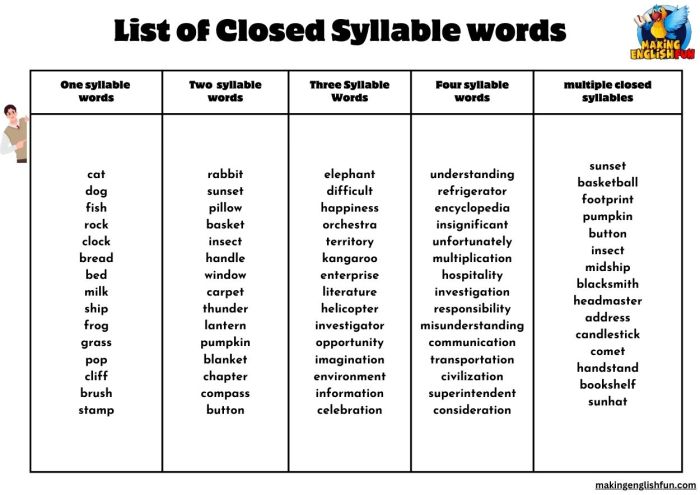
Comparing the syllable structure of “pump” to other similar words can provide insights into the patterns and exceptions in syllable structure related to the final consonant sound.
Words with Closed Syllables Ending in a Single Consonant
- pump
- dump
- jump
- lump
- rump
In these words, the final consonant sound is a single consonant, and the syllable is closed. This is because the final consonant is not followed by a vowel sound.
Words with Closed Syllables Ending in a Consonant Cluster
- stamp
- clamp
- limp
- romp
In these words, the final consonant sound is a consonant cluster, and the syllable is closed. This is because the final consonant cluster is not followed by a vowel sound.
Is “pump” a closed syllable? If you’re studying for the AP World History exam, you can find some helpful resources on fiveable ap world unit 1 . But getting back to our question, “pump” is indeed a closed syllable because it ends in a consonant sound and the vowel sound is short.
Exception
The word “bomb” is an exception to the pattern of closed syllables ending in a consonant sound. In this word, the final consonant sound is a single consonant, but the syllable is open because the final consonant is followed by a vowel sound.
Exceptions and Variations
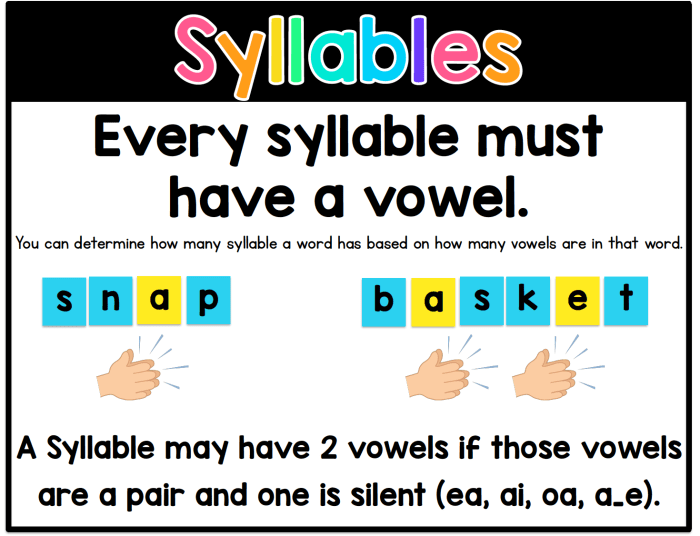
While the rules of syllable structure provide a general framework for understanding how words are divided into syllables, there are some exceptions and variations to consider.
Words with Consonant Clusters
One exception to the general rule that closed syllables end with a single consonant is when a word has a consonant cluster at the end. In this case, the syllable may be considered closed even though it ends with more than one consonant.
For example, the word “stop” has a closed syllable because it ends with the consonant cluster “st”.
Words with Silent Letters
Another exception to the general rule is when a word has a silent letter. In this case, the syllable may be considered closed even though it ends with a vowel. For example, the word “knife” has a closed syllable because the final “e” is silent.
Words with Diphthongs
Diphthongs are combinations of two vowel sounds that are pronounced as a single syllable. In this case, the syllable may be considered closed even though it ends with a vowel. For example, the word “tie” has a closed syllable because it ends with the diphthong “ie”.
Question Bank
Is every word with a consonant at the end a closed syllable?
No, the presence of a consonant at the end of a word does not automatically make it a closed syllable. The vowel sound preceding the consonant plays a crucial role in determining syllable structure.
Can a closed syllable have more than one vowel?
Yes, closed syllables can contain diphthongs, which are combinations of two vowel sounds pronounced as a single syllable. For example, the word “tie” has a closed syllable with the diphthong “ie”.